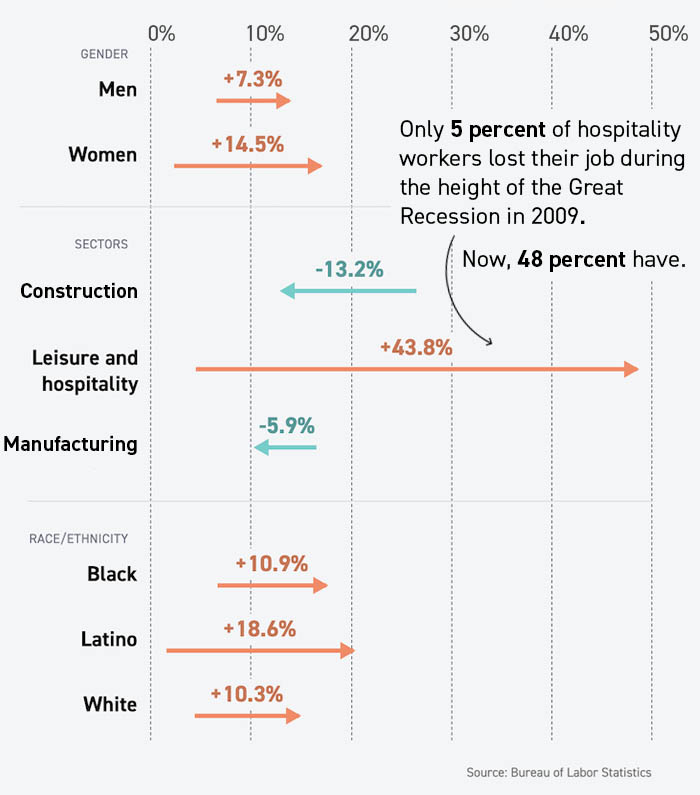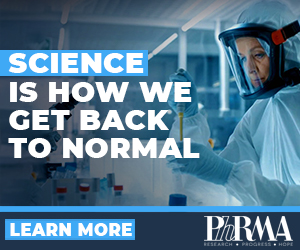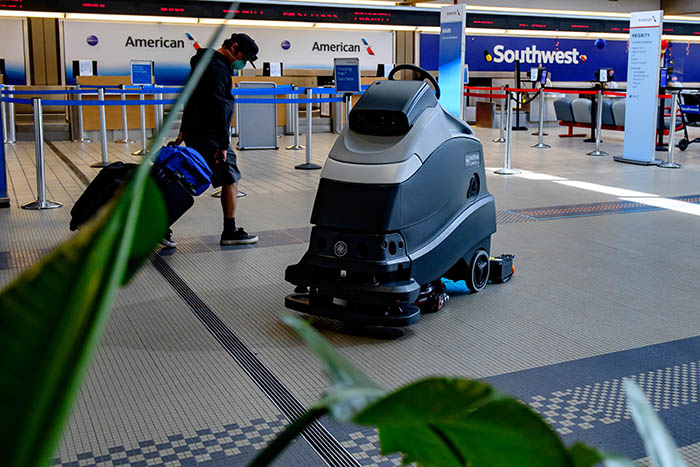 | ||||||
| ||||||
THE PANDEMIC OF PERSONAL RESPONSIBILITY — First, President Donald Trump handed the decision for when to reopen the economy to America’s governors. Now, as local leaders begin to lift shutdown restrictions, they’re passing the buck to a new potential fall guy for the anticipated rise of Covid cases and death counts: you, the state resident. Federal officials and governors from both parties have pushed the message of personal responsibility since the start of the coronavirus outbreak — we all know how to properly wash our hands after all of those videos. The current message from many governors, facing horrific jobless claims numbers, is: We’ve done our job, now it’s on you not to get sick. Mississippi’s Republican Gov. Tate Reeves pleaded with state residents earlier this week to stay vigilant as the state’s death count spiked and he moved to ease business restrictions: “Just because something is legal does not mean it is wise,” he said. “There is no government replacement for your personal responsibility.” New York’s Democratic Gov. Andrew Cuomo, visibly frustrated after presenting statistics showing hospitalizations rising among people who said they were staying at home, said Wednesday, “Much of this comes down to what you do to protect yourself.” South Dakota’s Republican Gov. Kristi Noem continued this week to dismiss the idea of statewide shutdown orders arguing, “The people themselves are primarily responsible for their safety.” North Dakota’s Republican Gov. Doug Burgum has pushed a similar message, but his state has also deployed a contact tracing and testing army to keep the virus contained. In Colorado, Democratic Gov. Jared Polis is lifting lockdowns, while addressing mounting anger over safety recommendations: “That's the flip side of the coin of freedom: personal responsibility to yourself and others." Iowa’s Republican Gov. Kim Reynolds emphasized “personal responsibility” Thursday at a news conference announcing that malls and other retailers could further open. Rhode Island’s Democratic Gov. Gina Raimondo lifted business restrictions saying, “I am trusting that people are going to do the right thing.” In Georgia, Republican Gov. Brian Kemp said now that businesses are allowed to operate, people are on their own to keep from getting sick: “We’ve got to get people to own their personal responsibility, to continue to do the right thing, stay away from folks in public, wear a mask in a crowded grocery store, wash your hands.” After weeks of stubbornly high case counts and staggering unemployment, these governors seem exasperated. They’re facing pressure from desperate businesses and restless residents to lift restrictions that have kept people indoors for weeks. But many have yet to finish the arduous task of building out public health infrastructure or bringing case counts low enough to keep the virus contained. They know they are making a risky bet. At the start of the pandemic, personal responsibility meant “help us flatten the curve by working together to follow our instructions and stay at home.” Now, at least in states that are reopening, it means almost the opposite: You’re on your own. The message seems to be: Sure, things are open, but that doesn’t mean we’re saying you should go out. And if things go south, we warned you. Welcome to POLITICO Nightly: Coronavirus Special Edition. Hope all the moms out there get celebrated even in quarantine. Reach out with tips: rrayasam@politico.com or on Twitter at @renurayasam. | ||||||
A message from PhRMA: In these unprecedented times, America’s biopharmaceutical companies are coming together to achieve one shared goal: beating COVID-19. We are working with governments and insurers to ensure that when new treatments and vaccines are approved, they will be available and affordable for patients. Explore our efforts. | ||||||
| ||||||
THE GOVERNOR WHO COULD SHUT DOWN TRUMP’S CONVENTION — North Carolina’s Roy Cooper is a Democratic governor, up for reelection in a Republican-leaning Southern swing state, pushing a go-slow approach to reopening the economy as protests intensify and neighboring states move more quickly. But that’s just the start, Maya King writes: How the first-term governor handles the reopening will likely dictate whether Trump and the Republican Party can forge ahead with a full-fledged convention in Charlotte this summer. So far, Cooper’s wait-and-see approach to reopening North Carolina has played well for him: A late-April Meredith Poll showed two-thirds of North Carolinians — including a plurality of Republicans — approve of his job performance. But what makes Cooper’s situation unique is the authority he wields over the other party’s national convention. Trump has been adamant about having a full-scale in-person convention as a symbolic show of national confidence in the face of coronavirus. But Cooper will have to walk a fine line between protecting and alienating his constituents. Senior Republicans in the state say the governor, for example, could ban such a large gathering outright. Or he could limit the number of people that could gather in any given place. Cooper has steered clear of predictions about the fate of the convention. Aides and Democrats in the state who work closely with him say he sees the event as a boon to North Carolina — it was expected to inject tens, if not hundreds of millions of dollars into the state economy — and he wants it to happen. If he’s forced to call it off or scale it back, it will be at the direction of public health officials whose advice he has heeded during the pandemic, they said. Cooper declined to be interviewed. | ||||||
JOIN MONDAY - PLAYBOOK VIRTUAL INTERVIEW WITH LIS SMITH: The traditional presidential campaign no longer exists; candidates have been forced to pivot from in-person rallies and fundraisers to an all-out digital faceoff. Join POLITICO Playbook co-authors Anna Palmer and Jake Sherman on Monday at 9 a.m. EDT for a virtual interview with Democratic campaign strategist Lis Smith to discuss ways to reimagine the party conventions amid a pandemic, Joe Biden’s virtual path to victory, and whether campaigning as we knew it is gone for good. Have questions? Submit yours by tweeting it to @POLITICOLive using #AskPOLITICO. REGISTER HERE. | ||||||
| ||||||
INSIDE THE JOB LOSSES — The people hit hardest by the historic levels of unemployment? Groups that voted against Donald Trump in 2016 — a reality that may shape the political response. A POLITICO analysis of Labor Department demographic data released today indicates that, so far, the people most likely to have lost their jobs to the Covid-19 pandemic are different from those who became unemployed during the Great Recession of 2007-09 — many of whom were still struggling to regain their economic footing when they pulled the lever for Trump. | ||||||
| ||||||
THINK LIKE A SCIENTIST — We’re consuming a lot of science news these days, but we — the collective newbie science nerd we — don’t always understand precisely what we’re reading or know how to distinguish good science from bad. Executive health editor Joanne Kenen emails us this advice: There are quite a few online resources to help you become a more sophisticated connoisseur. You can even teach yourself statistics instead of watching Korean baseball — and boast that you learned it at Harvard. But here are a few tips to help you make sense of the news, particularly as you read or hear about studies of potential drugs or vaccines. And keep in mind that I cover more policy than science — I’m learning a lot about coronavirus along with the rest of you. Preprints are … pre-liminary: Most of us had never heard of a preprint until recently, partly because they are relatively new. Preprints are more than a first draft of science. But they are far from the last draft. They are works in progress, write-ups posted on special, dedicated servers in an attempt to stimulate more intellectual exchange and constructive criticism among scientists. They aren’t peer reviewed. They aren’t final, though about 70 percent of them do eventually get published in peer-reviewed journals in slightly altered form. They are sometimes wrong, wrong enough to get withdrawn. But all of a sudden, amid the coronavirus crisis, lots of people are reading them, sharing them — and often misunderstanding or misrepresenting them. Unless you know a whole lot about scientific inquiry and research, think of them more as a tantalizing idea to keep your eye on than as gospel truth. Keep it under control: We’ve all seen these studies saying that X number of patients got better after taking Y drug. But without a control arm — science’s reality check, a group of patients getting a standardized version of a “regular” care — it doesn’t tell you that much. Most people, thankfully, survive the coronavirus. So if 15 people get a specific drug and all 15 survive, we don’t really know if it’s because of the drug unless we have a comparison group (particularly if the people didn’t have advanced illness). That doesn’t mean a well-designed observational (aka epidemiological) study isn’t useful — it can shed information and identify what’s worth further study. But it can only tell us so much. Which brings us to: The Letter N: No, we’re not telling you how to get to Sesame Street. N is short for the number of people in a study. In the hypothetical example above, 15 patients doesn’t really tell you much. You need enough study participants to draw conclusions that mean something. If 500 patients in that observational study had survived — it would still be observational but a bit weightier. And of course remember the scientific cliché: An N of 1 is an anecdote. Be clinical: “Preclinical studies” lay the groundwork for developing a medical intervention. Preclinical research often starts with an in vitro study on cells in a lab, what many of us laypeople would think of as test tube or petri dish research. If you see a headline or social media posting about an in vitro breakthrough — and this has been happening with coronavirus — it doesn’t mean it will work in people. In fact, the odds are it won’t. Lots of ideas do just great in a controlled laboratory setting sloshing around in cell cultures. But the human body is too complex to fit in a test tube. A clinical trial tests whether a treatment or therapy or intervention is safe and effective in human beings. A clinical trial may compare a treatment to standard or “usual” care, to a placebo, or sometimes to another new or newish treatment. In the proverbial gold standard, it will be an RCT — a Randomized Controlled Trial. That means study participants are randomly assigned to different treatment groups. A double blind RCT means that neither the researchers nor the study participants know which arm of the trial is which. Of mice and men: Mice are not people. Neither are monkeys. If you read a story about something working in mice — it is working in mice, and probably only in male mice. Should we be happy for the mice? Indubitably. But it doesn’t mean that a drug or vaccine or intervention that works in mice will work in homo sapiens (us). You probably saw reports that the experimental vaccine being developed at Oxford worked in monkeys (N = 6 monkeys in that study). Should we be glad? Yes. Should we be ecstatic? No. Six monkeys are six monkeys. (One more than this.) But if you come across a good long-lashed llama study — just enjoy it. THE NEEDLE AND THE DAMAGE DONE — Coronavirus could lead to yet another health crisis: a spike in preventable diseases like measles. Health care reporter Brianna Ehley emails: Results from a new CDC study out today found a “notable” year-over-year drop in orders for measles vaccines and other non-influenza childhood vaccines between March and April, shortly after the president declared the coronavirus a national emergency. Between March 13 and April 19, doctors ordered 2.5 million fewer doses of non-influenza vaccines and 250,000 fewer doses of measles vaccines compared to last year. Public health experts have been warning about a drop in demand for child immunizations as parents worry about risking coronavirus exposure at health centers. “As social distancing requirements are relaxed, children who are not protected by vaccines will be more vulnerable to diseases such as measles,” CDC researchers warned. The CDC and state health departments are trying to come up with solutions, including expanding access to mobile clinics. | ||||||
| ||||||
THREAT GROWS AT WHITE HOUSE — Katie Miller, a spokesperson for Vice President Mike Pence, has tested positive for coronavirus, according to two people with knowledge of Miller’s diagnosis, Dan Diamond and Myah Ward write. Miller’s positive diagnosis for Covid-19 puts the potential threat of the infection squarely into the president’s inner circle. Miller serves as the vice president’s top spokesperson, traveling with him frequently and attending meetings by his side. She is also married to another top White House aide and senior adviser, Stephen Miller, who writes the majority of Trump’s speeches and spends copious amounts of time around the president, Jared Kushner and Ivanka Trump. Bright coming back? — A federal watchdog recommends that ousted vaccine expert Rick Bright be reinstated while it investigates whether the Trump administration retaliated against his whistleblower complaints when it removed him from a key post overseeing the coronavirus response, Bright's lawyers said today. The Office of Special Counsel recommends that Bright be temporarily reinstated for 45 days as director of the Biomedical Advanced Research and Development Authority, a multibillion-dollar agency that funds companies to develop tests, treatments and vaccines, health care reporter Sarah Owermohle reports. | ||||||
| ||||||
Nightly asked you: What routines and activities, if any, are you resuming this week? Below are some of your responses, lightly edited for style and clarity. “I went to my plant nursery to buy my flowers. It was all conducted outside and with masks. This was my first trip out, besides walking my neighborhood and going to drive-thrus at CVS and the occasional McDonald’s Coke. I felt so ‘not normal’ and to be honest, still a bit nervous.” — Karen Camire, homemaker, Plainfield, Ill. “This weekend, we will dine with our son and daughter-in-law in their home; we have not seen them since mid-March. We plan to maintain social distance protocols. It’s a risk, but I hope it will be an acceptable one.” — Sara L. Urdahl, retired, Wenatchee, Wash. “I’m not resuming any activities this week. I’ve only left the house once per week to do necessary grocery shopping. I think it’s still too risky to resume too quickly.” — Stephen Carleton, PR professional, Elizabeth City, N.C. | ||||||
| ||||||
“We can finally go for a walk during a prescribed time of the day. It is wonderful to see people, hear conversations, and enjoy the springtime air.” — Shawn Ann Lowe, teacher, Sabadell, Spain “We have begun to enjoy picnics with individual family members and friends, utilizing lawn chairs, lake views, appropriate social distancing and take-out sandwiches. While not ideal, it is very acceptable in these distressing times.” — Wayne Corey, retired, Madison, Wis. “We found out our dog groomer is opening so got an appointment to take our shih tzu in. He is way overdue! The groomer is using a concierge service to get the pet from the parking lot from a numbered parking space and deliver him later.” — Linda Leroux, retired, Lakewood, Ohio “Sending my teenage boys to play golf on the public course near our house as soon as Maryland opens the courses. There’s only so much Fortnite playing I can tolerate!” — Michelle Russo, chief communications officer, U.S. Chamber of Commerce, Silver Spring, Md. | ||||||
A UV cleaning robot cleans the floor at Pittsburgh International Airport, the first in the U.S. to test the use of the ultraviolet rays to scrub coronavirus from surfaces. | Jeff Swensen/Getty Images | ||||||
| ||||||
| ||||||
NEXT WEDNESDAY - WHY IS THE INCARCERATION RATE OF WOMEN RISING? Women are the fastest-growing segment of the incarcerated population in the United States, increasing at a rate nearly double that of men over the past 35 years. Join Women Rule Editorial Director Anna Palmer on Wednesday at 3 p.m. EDT for a virtual conversation with April Grayson, campaign surrogate and statewide coordinator for the Young Women's Freedom Center; Scott Budnick, founder of the Anti-Recidivism Coalition (ARC); and Emily Ratajkowski, model, actress and activist. Learn about the challenges women face behind bars and how they fit into the criminal-justice reform movement. Have questions? Submit yours by tweeting it to @POLITICOLive using #AskPOLITICO. REGISTER HERE. | ||||||
| ||||||
SPECIAL RELATIONSHIP NEEDS COUNSELING — Among Britons, historically rosy views of their transatlantic allies have taken a major hit during the coronavirus crisis, Laurenz Gherke writes. A new British Foreign Policy Group survey taken in late April and early May shows just 28 percent of people in the U.K. trust the U.S. "to act responsibly in the world," down 13 percentage points since January. Conservative Party voters had the most notable drop, as they were previously more supportive of Washington. Regardless of their lack of confidence in the U.S., most Brits echoed Trump's stance on China, with 83 percent saying they don't trust Beijing's intentions in the world (up 4 percentage points). Meanwhile, Brits' trust that the EU will act responsibly on the world stage has risen slightly, up 2 points since January to 60 percent, and a total of 75 percent said they had faith in Germany. | ||||||
A message from PhRMA: In these unprecedented times, America’s biopharmaceutical companies are coming together to achieve one shared goal: beating COVID-19. The investments we’ve made have prepared us to act swiftly: | ||||||
Did someone forward this email to you? Sign up here. | ||||||
Follow us on Twitter
| ||||||
Follow us
|
UNDER CONSTRUCTION - MOVED TO MIDDLEBORO REVIEW AND SO ON https://middlebororeviewandsoon.blogspot.com/
Saturday, May 9, 2020
POLITICO NIGHTLY: Governors to citizens: The buck stops with you
Subscribe to:
Post Comments (Atom)
Sen. Slotkin Refuses To Comply With Trump Regime, Sen. Gallego Calls For General Strike If This Happens, and Mayor Mamdani Takes On ICE
LOTS OF POSTS IGNORED BY BLOGGER..... ALL POSTS ARE AVAILABLE ON MIDDLEBORO REVIEW AND SO ON Sen. Slotkin Refuses To...

-
04 April 23 Live on the homepage now! Reader Supported News Dahlia Lithwick | Let Donald Trump Cry It Out Dahlia Lithwick, Slate Lithwic...
-
A Democrat in the Wilderness Wow! That must have really got him mad!!! I Love it! ...
-
Trump Tyranny Tracker: Day 311 November 26, 2025 Olga Lautman Dec 4 In a notice, the Consumer Financial Protection Bureau described its ow...




No comments:
Post a Comment
Note: Only a member of this blog may post a comment.